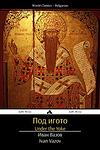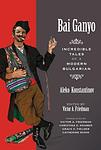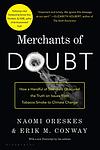The Greatest Bulgarian, Brazilian Books of All Time
Click to learn how this list is calculated.
This list represents a comprehensive and trusted collection of the greatest books. Developed through a specialized algorithm, it brings together 300 'best of' book lists to form a definitive guide to the world's most acclaimed books. For those interested in how these books are chosen, additional details can be found on the rankings page.
Genres
Countries
Date Range
Reading Statistics
Click the button below to see how many of these books you've read!
Download
If you're interested in downloading this list as a CSV file for use in a spreadsheet application, you can easily do so by clicking the button below. Please note that to ensure a manageable file size and faster download, the CSV will include details for only the first 500 books.
Download-
1. The Alchemist by Paulo Coelho
A young Andalusian shepherd named Santiago dreams of finding a worldly treasure and sets off on a journey across the Egyptian desert in search of it. Along the way, he encounters a series of characters who impart wisdom and help guide his spiritual journey. The novel explores themes of destiny, personal legend, and the interconnectedness of all things in the universe. The boy learns that true wealth comes not from material possessions, but from self-discovery and attaining one's "Personal Legend".
-
2. The Hour of the Star by Clarice Lispector
"The Hour of the Star" is a poignant narrative that explores the life of Macabéa, a poor, unattractive, and naive typist living in the slums of Rio de Janeiro. The story is narrated by Rodrigo S.M., a sophisticated writer who struggles with how to accurately portray Macabéa's simple existence and her tragic fate. The novel delves into themes of identity, poverty, and the human condition, presenting a stark contrast between the lives of the rich and the poor, the educated and the ignorant, and the beautiful and the plain.
-
3. The Devil to Pay in the Backlands by Joao Guimaraes Rosa
"The Devil to Pay in the Backlands" is a complex narrative that follows the life of a Brazilian sertanejo (backlands dweller) who becomes a bandit and a feared killer. Tormented by his violent actions, he embarks on a metaphysical journey, wrestling with philosophical and religious questions, and trying to reconcile his deep belief in fate and predestination with his own free will. The book is notable for its innovative language, blending regional dialects with neologisms and classical references, which adds to its rich portrayal of the Brazilian backlands.
-
4. The Posthumous Memoirs of Bras Cubas by Machado de Assis
The novel is a unique and satirical work, narrated by a dead man, Bras Cubas, who recounts his life from beyond the grave. The story is filled with ironic humor and philosophical musings as Bras Cubas explores his past, his relationships, and the societal norms of his time. The narrative breaks conventional storytelling norms, often addressing the reader directly and jumping through time without warning. Themes of love, wealth, power, and the human condition are explored, providing a critique of 19th-century Brazilian society.
-
5. Dom Casmurro by Machado de Assis
The novel is a darkly comic, yet tragic exploration of love, betrayal, and jealousy, told through the unreliable narration of the protagonist, a middle-aged man who believes his wife has cheated on him with his best friend. The narrative is filled with ambiguity and uncertainty, forcing readers to question the reality of the events described. The novel is also a profound exploration of the human psyche and the destructive power of obsession.
-
6. Auto Da Fé by Elias Canetti
"Auto Da Fé" is a story about Peter Kien, a renowned sinologist who is obsessed with his library of books. His life takes a turn when he marries his illiterate housekeeper, Therese, who is only interested in his wealth. After a series of mishaps, Kien is tricked out of his home and ends up living on the streets. The novel explores themes of obsession, intellectualism, and the destructive power of the mind.
-
7. The Passion According to G.H. by Clarice Lispector
"The Passion According to G.H." is a philosophical novel that delves into the existential crisis of a wealthy Brazilian woman who, after killing a cockroach in her maid's room, experiences a profound metaphysical crisis. The narrative unfolds as a stream of consciousness that explores themes of identity, existence, and the nature of reality. The protagonist's journey forces her to confront her own humanity, the concept of nothingness, and the chaotic, interconnected nature of life. It's a profound and introspective exploration of the human condition and the meaning of existence.
-
8. Kafka's Other Trial by Elias Canetti
This book is a detailed examination and interpretation of the correspondence between a renowned author and his fiancée, Felice Bauer. The author uses these letters to analyze the writer's psyche, his relationships, and his work. The book provides a unique insight into the author's life and the influence of his engagement on his writing, particularly his novel "The Trial". The author's struggle between his commitment to writing and his relationship with Felice forms the central theme of the book.
-
9. Under the Yoke by Ivan Vazov
"Under the Yoke" is a historical novel set during the April Uprising in Bulgaria in 1876 against the Ottoman Empire. It presents a vivid portrayal of the events leading up to the uprising, the rebellion itself, and its tragic aftermath, through the eyes of the inhabitants of a small Bulgarian town. The novel explores themes of patriotism, sacrifice, love, and the struggle for freedom, providing a detailed and realistic depiction of the period.
-
10. Rebellion In The Backlands by Euclides da Cunha
This book offers a detailed and vivid account of the War of Canudos, a significant peasant revolt that took place in the late 19th century in the Brazilian backlands. Through a blend of historical documentation and narrative, the text explores the socio-political conditions that led to the uprising, the charismatic leadership of Antônio Conselheiro, and the brutal suppression of the rebellion by the Brazilian government. The author delves into the geography, culture, and lives of the backland inhabitants, providing a deep analysis of the conflict as a reflection of the broader struggles within Brazilian society. This work is not only a historical account but also a profound commentary on the themes of civilization versus barbarism, social injustice, and the complexities of national identity.
-
11. Bai Ganyo by Aleko Konstantinov
"Bai Ganyo" is a satirical novel that follows the eponymous protagonist, a comically boorish Bulgarian rose-oil merchant, as he travels through various European cities. The book humorously critiques the cultural misunderstandings and faux pas that Bai Ganyo commits, which serve as a metaphor for the broader social and political foibles of Bulgarians during the post-liberation period from Ottoman rule. Through a series of vignettes, the protagonist's adventures expose the clash between traditional Bulgarian ways and modern European society, ultimately offering a sharp commentary on the challenges of cultural integration and the preservation of national identity in the face of globalization.
-
12. Macunaíma by Mario de Andrade
This book is a hallmark of Brazilian literature, blending folklore, social critique, and surrealism to narrate the adventures of its eponymous hero, a shapeshifting character of indigenous origin who embarks on a journey from the Amazon rainforest to the city of São Paulo. Throughout his quest to retrieve a magical amulet stolen by a fearsome giant, the protagonist encounters a myriad of mythical creatures, gods, and figures from Brazilian folklore, all while satirizing the cultural and social issues of early 20th-century Brazil. The narrative is celebrated for its inventive language, playful use of Brazilian vernacular, and its pivotal role in the Brazilian Modernist movement, offering a unique exploration of national identity, racial diversity, and the complex relationship between tradition and modernity.
-
13. A Ballad for Georg Henig by Viktor Paskov
"A Ballad for Georg Henig" is a narrative that explores the life of a Jewish craftsman and violin maker, Georg Henig, in the 18th century. The story is set in Bulgaria and delves into the historical events and cultural dynamics of the time, including the Ottoman rule and the social status of Jews. The protagonist's life is filled with love, loss, and the quest for artistic perfection, all against the backdrop of a society marked by religious and ethnic tensions.
-
14. Veronika Decides to Die by Paulo Coelho
The novel centers around Veronika, a young woman from Slovenia who, disillusioned by her life and the world, decides to commit suicide. Surviving her attempt, she wakes up in a mental institution where she learns that her failed attempt has left her with only a few days to live. During her stay, she meets a variety of characters, each with their own mental issues, who help her to see her life in a new perspective. The story explores themes of madness, individuality, and the value of life, challenging societal norms and questioning the meaning of sanity.
-
15. Tent of Miracles by Jorge Amado
"Tent of Miracles" is a satirical novel that explores the themes of racism, colonialism, and the power of knowledge. The story revolves around the life of a poor, mixed-race Bahian scholar who is unrecognized in his own land but becomes a posthumous celebrity when a Nobel laureate praises his work. This sudden fame brings attention to his writings and his message against racial discrimination, and the book also portrays the vibrant culture and diversity of Bahia, Brazil.
-
16. Gabriela, Clove and Cinnamon by Jorge Amado
Set in the 1920s in the Brazilian town of Ilhéus, the novel tells the story of a beautiful and charismatic migrant worker, Gabriela, who becomes a cook in the home of a wealthy bar owner. As the town, historically dominated by a few wealthy cacao planters, undergoes economic and social changes, Gabriela and her employer fall in love. Their relationship, however, is challenged by their different social statuses, the town's traditional values, and the employer's political ambitions. The story is a vivid portrayal of Brazilian culture, exploring themes of race, gender, class, and tradition versus progress.
-
17. Natural Novel by Georgi Gospodinov
"Natural Novel" is a thought-provoking and imaginative work that seamlessly weaves together various narratives and perspectives. The book explores the concept of storytelling and its power to shape our understanding of reality. Through a blend of fiction, memoir, and philosophical musings, the author delves into the complexities of human existence, the interconnectedness of life, and the search for meaning in a world filled with both beauty and tragedy. With its poetic prose and profound insights, "Natural Novel" invites readers to contemplate the boundaries between truth and fiction, ultimately challenging conventional notions of storytelling.
-
18. The Voices of Marrakesh: A Record of a Visit by Elias Canetti
This book is a travelogue that captures the author's experiences and observations during a visit to Marrakesh, Morocco. The author vividly portrays the city's vibrant culture, bustling markets, and unique characters, giving readers a glimpse into the everyday life of Marrakesh. The book also explores deeper themes such as the clash between tradition and modernity, and the power dynamics between the city's various social classes.
-
19. Time Of Parting by Anton Donchev
The novel is a historical drama set in the 17th century in the Rhodope Mountains, exploring the cultural and religious conflict between the Christian Bulgarians and the Ottoman Empire. It follows the story of a Bulgarian village facing the threat of Islamization, as the Ottoman authorities impose a conversion campaign. The narrative delves into the choices and struggles of the villagers, particularly the character of the village leader, who must navigate between resistance and survival. The book examines themes of identity, faith, and the complexities of coexistence during a time of oppressive rule and societal upheaval.
-
20. Tobacco by Dimitar Dimov
The book in question is a historical novel set in the early 20th century, exploring the lives of characters involved in the tobacco industry in Bulgaria. It delves into the personal and political turmoil of the time, focusing on the struggles of the working class and the manipulations of the wealthy elite. The narrative intertwines love, betrayal, and ambition, as it portrays the harsh realities of labor exploitation and the social upheavals leading up to World War II. Through its vivid characters and rich descriptions, the novel offers a critical look at the impact of capitalism and the quest for power on individuals and society.
-
21. The Iron Candlestick by Dimitar Talev
The book is a historical novel set in the early 20th century, focusing on the struggles of the Bulgarian people under Ottoman rule. It follows the life of a young Bulgarian boy from his childhood to his involvement in the national liberation movement. The narrative weaves personal and political threads, depicting the boy's growth amidst the backdrop of cultural oppression, resistance, and the quest for national identity. The story is a poignant exploration of the human spirit and the fight for freedom, showcasing the resilience of a community striving to preserve its heritage and autonomy against the odds.
-
22. Osadeni Dushi by Dimitar Dimov
The novel is a poignant exploration of the human condition, set against the backdrop of a tuberculosis sanatorium in the mountains of pre-World War II Spain. It delves into the lives of the patients and staff within the sanatorium, weaving a complex tapestry of love, betrayal, and philosophical introspection. The narrative focuses on the intense and tragic love affair between a disenchanted monk and a passionate, free-spirited woman, both seeking meaning and redemption amidst the despair of their illness. Through their story, the novel examines themes of morality, existential anguish, and the struggle for spiritual and emotional liberation.
-
23. Extracts From Notes On The Bulgarian Uprisings by Zahari Stoyanov
The book is a seminal historical account that provides a detailed chronicle of the Bulgarian uprisings against Ottoman rule in the 19th century. Through a compilation of personal observations, interviews, and documents, the narrative vividly portrays the struggles, sacrifices, and heroism of the Bulgarian revolutionaries. It serves as both a tribute to the national liberation movement and a meticulous record of the events leading up to the eventual liberation of Bulgaria, offering an invaluable perspective on the country's fight for independence and the broader context of Balkan history during this tumultuous period.
-
24. The Bells Of Prespa by Dimitar Talev
The novel is a historical saga set in the early 20th century, focusing on the lives and struggles of the Macedonian people under Ottoman rule. It weaves a rich tapestry of characters, both fictional and real, as they navigate the complexities of national identity, cultural heritage, and political upheaval. The narrative delves into the personal and collective challenges faced by the inhabitants of the Prespa region, highlighting their resilience and the impact of historical events on their daily lives. Through the symbolic resonance of the bells, the story captures the essence of a community's enduring spirit amidst the tides of change and the quest for freedom and self-determination.
-
25. Антихрист by Emilian Stanev
The book in question is a historical novel that delves into the turbulent times of the Second Bulgarian Empire, focusing on the life of a fictional anti-hero who embodies the contradictions and struggles of his era. Set against the backdrop of political upheaval and religious conflict, the protagonist's journey is marked by his quest for power and his complex relationship with morality, faith, and his own identity. As he navigates a world rife with betrayal and intrigue, the novel explores themes of ambition, human nature, and the societal forces that shape individuals during times of crisis.
Reading Statistics
Click the button below to see how many of these books you've read!
Download
If you're interested in downloading this list as a CSV file for use in a spreadsheet application, you can easily do so by clicking the button below. Please note that to ensure a manageable file size and faster download, the CSV will include details for only the first 500 books.
Download


















